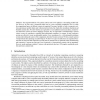Free Online Productivity Tools
i2Speak
i2Symbol
i2OCR
iTex2Img
iWeb2Print
iWeb2Shot
i2Type
iPdf2Split
iPdf2Merge
i2Bopomofo
i2Arabic
i2Style
i2Image
i2PDF
iLatex2Rtf
Sci2ools
138
Voted
COCOON
2005
Springer
2005
Springer
On Sequential and 1-Deterministic P Systems
Abstract. The original definition of P-systems calls for rules to be applied in a maximally parallel fashion. However, in some cases a sequential model may be a more reasonable assumption. Here we study the computational power of different variants of sequential P-systems. Initially we look at cooperative systems operating on symbol objects and without prioritized rules, but which allow membrane dissolution and bounded creation rules. We show that they are equivalent to vector addition systems and, hence, nonuniversal. When these systems are used as language acceptors, they are equivalent to communicating P systems which, in turn, are equivalent to partially blind multicounter machines. In contrast, if such cooperative systems are allowed to create an unbounded number of new membranes (i.e., with unbounded membrane creation rules) during the course of the computation, then they become universal. We then consider systems with prioritized rules operating on symbol objects. We show two t...
Related Content
| Added | 26 Jun 2010 |
| Updated | 26 Jun 2010 |
| Type | Conference |
| Year | 2005 |
| Where | COCOON |
| Authors | Oscar H. Ibarra, Sara Woodworth, Hsu-Chun Yen, Zhe Dang |
Comments (0)

